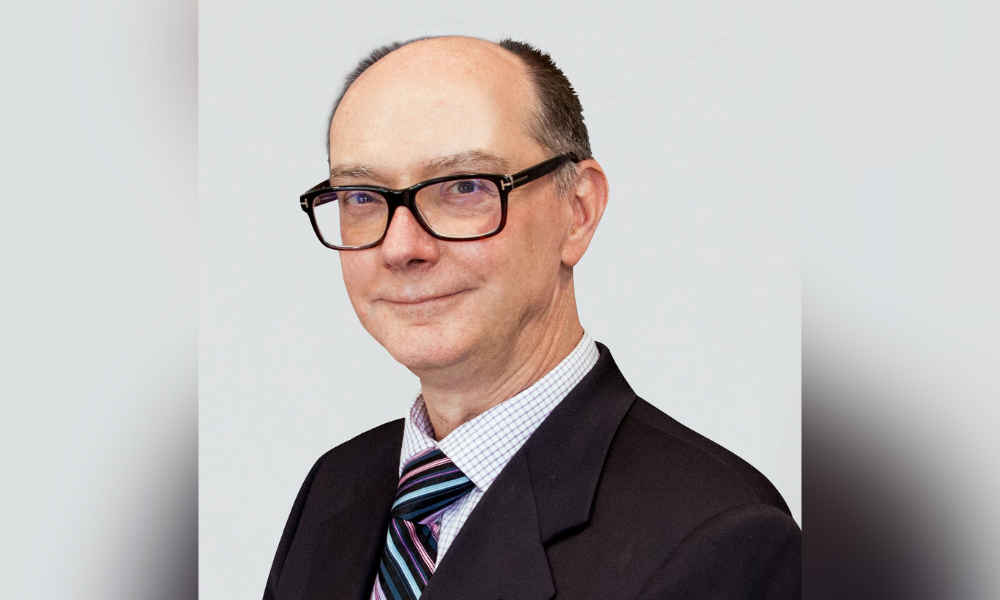
Beney was president of the Intellectual Property Institute of Canada before he led the IP firm

With its broad range of practice groups in every main area of intellectual property, Bereskin and Parr benefits from a bird’s eye view of innovation in Canada. The firm sees many IP trends outside of its individual client’s legal issues, from life sciences to artificial intelligence and patents to trademarks.
Before he took the helm as managing partner in January 2020, Stephen Beney was heavily involved in the Intellectual Property Institute of Canada. This involvement gave Beney, who also provides patent advice at the firm and leads the medical devices practice group, an even broader sense of domestic and international IP trends.
Beney joined the governing body of the IPIC in 2009, and then he was selected as the president in 2016.
“That put me in a lot of contact with government officials across the country, particularly in Ottawa at the federal level,” says Beney. “Whenever I talk about things internally, I'm able to say, ‘this issue is also coming up in this jurisdiction.’”
While Beney had several ideas about what he wanted to achieve when he took the helm at B&P, the “pandemic kind of overtook a lot of those plans,” he says.
Beney’s predecessor, Micheline Gravelle, has a background in immunology and continues to head up the life sciences group.
“I think she apologized to me almost every day for quite some time,” Beney jokes, regarding the timing of the transition.
2020 “was very hectic, managing expectations of the staff and the partners and getting the messaging out there,” says Beney.
He says 2020 overall had a positive effect on the firm, though, since everyone banded together to get through the crisis.
“2021 was actually a more difficult year in some ways than 2020,” says Beney, with more stringent lockdowns and no immediate end in sight for work-from-home arrangements.
With those challenges in mind, the firm formed a culture committee in the summer of 2021. “I realized quickly that the pandemic is not going away anytime soon,” says Beney. “And if it does go away, people being in the office full time is not going to be happening anytime soon. And so how do we retain our firm culture, which is really important to us?”
Beney says most lawyers began to tire of virtual socials, and the firm is doing an extensive survey of staff about the B&P culture, with the goal of “making sure that B&P stays B&P going forward.”
For colleagues who have worked together for many years, the pandemic didn’t significantly affect those relationships, he says. But maintaining connections with new associates required more work, and the firm is planning several initiatives to help with their social and work engagement with the firm.
On the client side, Beney speaks in broad strokes about the volume of filings in several areas, most of which have stayed steady or grown during the pandemic.
Beney says the number of patent filings the firm has done, both domestically and internationally, has grown, with international seeing a higher growth rate.
“Patent filings in Canada as a whole have been decreasing a bit over the last few years,” says Beney. “So, the fact that we've increased filings, I think means we've actually increased our market share.”
Beney says companies are continuing to focus on innovation throughout the pandemic and a push by governments on the importance of IP protection has also helped.
“Historically, the IP awareness has not been very high. And so, this activity by the government is raising IP awareness which as a result is causing more people to at least come to us to see what that means.”
Two significant industry groups at B&P – life sciences and engineering – have also been very busy.
Beney attributes much of the activity in the life sciences group to an increase in government funding.
The engineering group includes several areas of significant focus for Canada's public and private sectors, such as mechanical innovation, artificial intelligence, and quantum computing. The firm just launched a new quantum technologies practice group this year.
The “AI software groups have definitely grown as well over the last few years,” says Beney.
For trademarks, Canada joined the Madrid Protocol in 2019, enabling trademark owners to file a single application for international registration with the World Intellectual Property Organization.
“We are seeing more Madrid designations in Canada as more companies start to take advantage of Canada joining the Madrid Protocol. Although this came into force before the pandemic, we have seen more companies take advantage of [the] Madrid [agreement], particularly in the past year,” Beney told Canadian Lawyer earlier this year.
Beney says B&P expected an uptick in Madrid disputes, which has borne out.
The biggest issue for trademark clients, though, is the severe delays at the trademark office, which Beney describes as an “unintended consequence of Madrid.”
“Trademark applications are now sitting in the office for almost three years, which is a really long time. It's almost embarrassing….We're positioning ourselves aggressively to be at the forefront of that dispute resolution issue.”
Beney says the firm’s regulatory and privacy groups have also been very busy, and the firm is regularly “looking for tangential opportunities to the core IP that we do to expand those revenue sources.”
Finally, Beney says the firm is always looking to automate the high-volume, low-dollar processes. “We have a lot of transactions, like files, matters, and cases, flowing through in a given day. …We're looking at ways to automate a lot of those processes.”
Stephen Beney is a judge at this year's Canadian Law Awards, which recognizes the nation’s leading law firms, in-house legal teams, individuals, deals and cases over the past year.